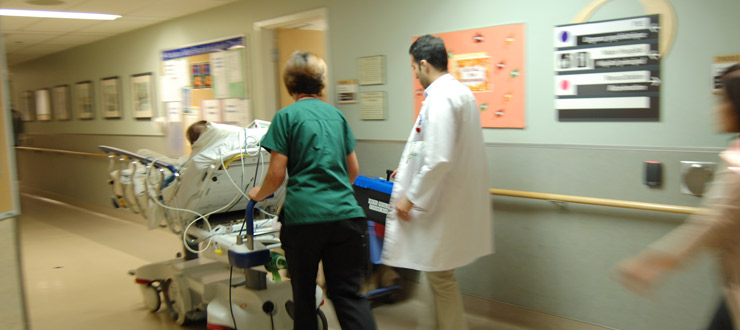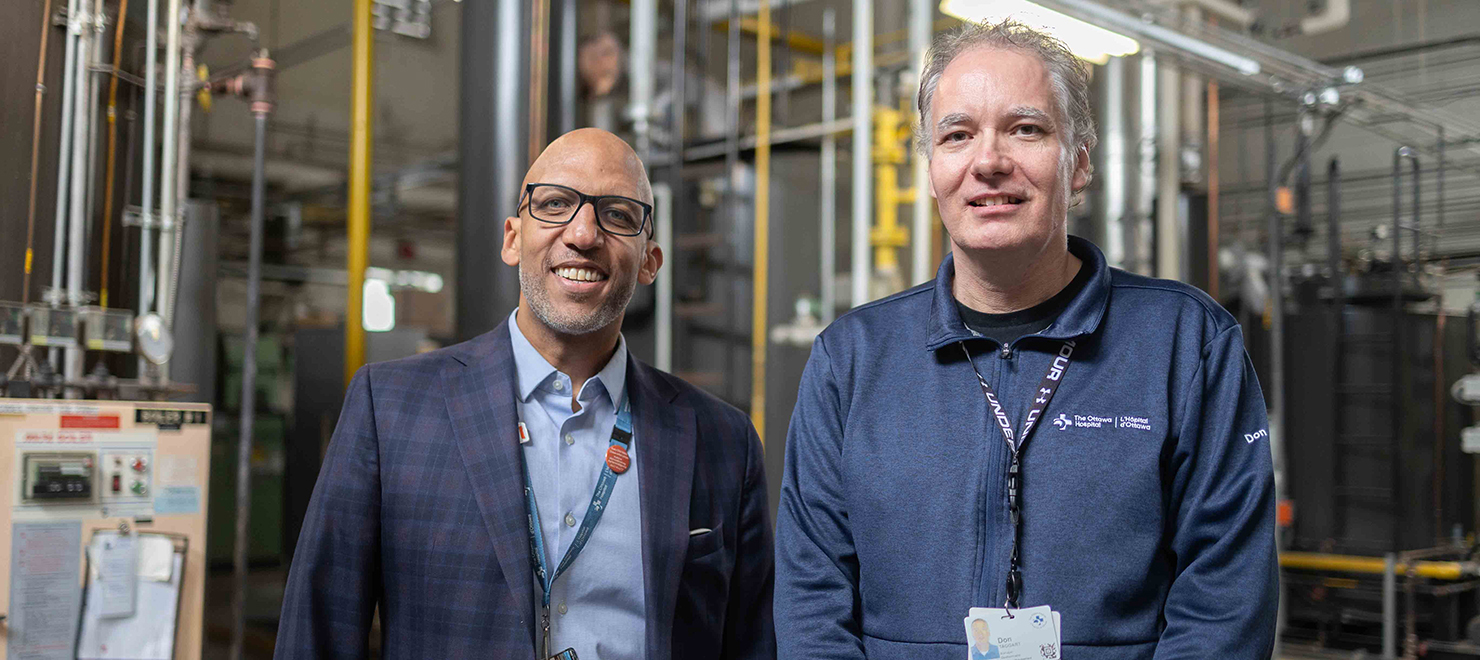
Canadian record set
When someone suffers a stroke, speed is essential in identifying whether they need to receive the clot-busting drug tPA. One way to speed up the process is to bring a toolbox with tPA and necessary stroke treatments to the CT scanner with the patient, so the drug can be given sooner.
“Millions and millions of brain cells die every minute when someone suffers a stroke,” said Emergency Nurse Educator Jennifer Payne.
Considering how much brain damage a stroke causes every minute, it’s critical for patients to receive the drug tPA as soon as possible. Tissue plasminogen activator, known as tPA, can dissolve blood clots that are blocking an artery to the brain. This restores the blood flow and prevents more brain cells from dying. The sooner tPA is given to patients after they suffer a stroke, the more effective it is.
That’s why The Ottawa Hospital’s Door-to-Needle program aims to shorten the time between when stroke patients come through the Emergency Department doors and when they are injected with tPA.
“The faster you give it, the better the chance someone has of recovering from their stroke,” said Dr. Grant Stotts, Director of The Ottawa Hospital Stroke Program.
In June, the stroke team, made up of doctors and nurses from the Emergency and Neurology departments, set a Canadian door-to-needle record of eight minutes.
This is an incredible achievement considering it took an hour when the program started 10 years ago. In 2012, the time was reduced to 45 minutes and in 2013, the team set a Canadian record of 12 minutes.
“We strive for under 30 minutes now: arrival time to needle,” said Payne. “About 25 minutes is the time it takes to make the decision to give the tPA drug.” However, she added, the team often succeeds in doing it under 20 minutes.
Every patient must be accurately assessed before the drug is administered, including a CT brain scan. After examining the scan, the neurology team decides whether the patient should get tPA. So, how do you go faster? Dr. Stotts said the team works to improve the system – figuring out how to do each step to make it safer and faster.
“There has been analysis at every step of the process to see where those time improvements can be made,” said Cari Poulin, Emergency Department Nurse Educator at the Civic Campus. One of those improvements includes bringing a toolbox with tPA and necessary stroke treatments to the scanner with the patient.
In June, the Emergency Department was alerted by the Queensway Carleton Hospital that a stroke patient had been assessed and was on the way to the Civic. When the ambulance arrived, the team was ready. It put its system into action and administered the tPA within minutes of arrival.
“We had the fastest time in Canada at eight minutes,” said Dr. Stotts.
He said the best practices to speed up door-to-needle times are shared with other stroke teams in hospitals across Canada. “We are one of the leaders, and so what we do influences everybody around us.”
The stroke team’s ability to improve the drug delivery time is testament to its commitment to world-class care.

Support patient care and research at
The Ottawa Hospital
You might also like…
“Crash testers”: Preparing our health-care teams for real-life emergencies
Swapping patients for manikins, our Simulation Patient Safety Program recreates medical emergencies right in our hospital, allowing our care teams to “crash test” their responses to cardiac arrests, respiratory failures, mass casualty events and more. Dive into this Q&A for a closer look at how this training program enhances patient safety and quality of care.
These nurses invite you to recycle their idea
At The Ottawa Hospital, we strive to lead in sustainable health care — something we can only achieve with the help of our frontline staff. Geriatric medicine nurses Caiti and Sabrina rallied their unit together to optimize recycling and divert waste from the landfill. Find out how they binned it to win it (And we can’t promise you that that’s the last recycling pun in this article!).
After a traumatic brain injury, this physician is on a mission to improve inclusion of docs with disabilities
Motivated by his own experience, Dr. Michael Quon has helped create a new accessibility and accommodation policy for physicians with disabilities in The Ottawa Hospital’s Department of Medicine.
“We never thought we’d save THIS much”: Big win for sustainability at the Riverside Campus
With just a few simple fixes and replacements, our facilities team has massively reduced the carbon footprint at the Riverside Campus — the equivalent of taking 229 cars off the road for a year. So, what’s the team’s secret green sauce? Read this article to find out…
The Ottawa Hospital and YouTube Health partner to increase access to health information in Canada
Looking for health information online can lead you down a rabbit hole of misinformation. That’s why we’ve launched a series of videos with YouTube Health. Presented in both English and French by experts from across The Ottawa Hospital, these videos cover everything you need to know about an array of common medical conditions.
A special video message for International Women’s Day
Every year on March 8, we recognize International Women’s Day to celebrate how far we have come with equal rights and opportunities for women, and to acknowledge how far we still have left to go. This video is a short-but-sweet reminder that the women who work for our organization are driven, caring, innovative and powerful.


 To reset, hold the Ctrl key, then press 0.
To reset, hold the Ctrl key, then press 0.





